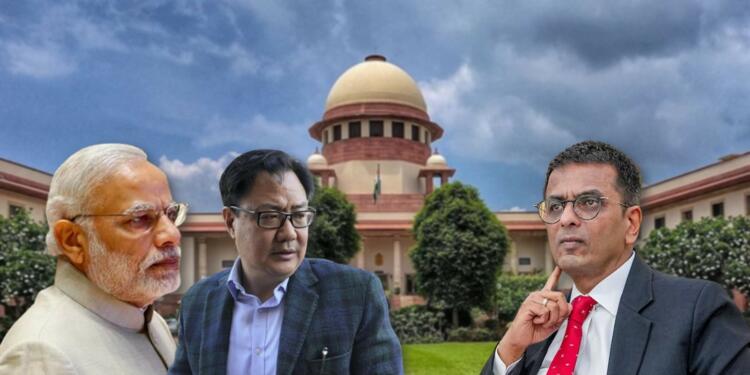Collegium System India: The Lok Sabha elections of 2014 had in many ways put the nation in a revamp mode. Looking from a vantage point, the most significant drift towards judicial transparency was brought by the Modi government through the legislation on National Judicial Appointment Commission. However, the Supreme Court in a detailed acumen declared the NJAC as unconstitutional. The event marked a longstanding ongoing tussle between the Centre and the Supreme Court with respect to the system of appointment of High Court and Supreme Court judges.
Over the past few months, ever since CJI Chandrachud took charge, both the CJI and the Law Minister had been quite vocal about their stance on NJAC at various academic events. However, the tussle between the judiciary and legislature, once again came to public attention by a recent letter of the Union Law Minister Kiren Rijiju.
In the letter addressed to the Chief Justice of India D Y Chandrachud, the Union Minister pointed out the fallacies of the current collegium system and “suggested” for the inclusion of a government nominee in the “evaluation committee” of the collegium.
Through the move, the government aims to promote transparency in the decision-making/ recommendation process of the collegium system, which selects the judges of the Supreme Court and High Court. Further, a report of The Indian Express claims that the letter highlighted that the Memorandum of Procedure regarding the appointment of judges was still “pending finalization” and gave “suggestions on how best it can be streamlined”.
Executive and Legislators depicts the Judiciary as the fall guy
The entire NJAC issue picked fire after the recent admonition of the legislators by Vice President Jagdeep Dhankhar in his preliminary address in the Rajya Sabha. The deliberation of VP Dhankhar’s address depicted the Judiciary as a fall guy as he called the Collegium System “opaque” and suggested that it was “never too late to reflect”.
Presiding over the Rajya Sabha for the first time as Chairperson, on December 7, 2022, VP Dhankhar called on the Judiciary to respect the “Lakshman rekha” and not resort to judicial overreach. Following the incident, the CJI Chandrachud took over as the 50th CJI on November 9, 2022. The learned jurist has ever since been advocating the stance of the judiciary on various public forums.
On the other hand, the advocate turned politician, Law Minister Rijiju had been propagating the government’s point of view to bring about greater executive influence on judicial appointments. Moving ahead, the Union Minister in an act of reflection has written a letter to the CJI, to accommodate a government nominee in the existing collegium system. Interestingly, the contents of the letter bring out the departure of the government from the previous stance of advocating a more diverse and plural NJAC.
Also read: Brace yourselves, NJAC is coming back!
The latest proposal from the Centre, as outlined in a letter from Union Minister Rijiju, suggests that government representatives should be included in the Supreme Court and High Court Collegium. This is a departure from the current system where the Supreme Court Collegium is made up of the Chief Justice of India and four other senior-most judges of the top court, while the High Court Collegium comprises the Chief Justice of the High Court and two senior-most judges of that High Court.
Further, the government aims to revisit the current position wherein the recommendations of the Collegium stand binding on the government. With the government only bestowed with the power to suggest reconsideration under the present system, the Union Minister’s proposal seeks to enhance the role of the government in the decision-making process of judge’s selection.
Also read: Kiren Rijiju talks about doing away with the collegium system in the Judiciary
Critics play down the Law Minister’s proposal
The proposal of the Union Minister, which seeks to incorporate a representative of the government in the system of collegium, would promote transparency. However, it will also enhance central government’s interference in the judiciary. Consequently, the letter of the Union Minister has attracted the eyes of various critics.
RJD leader and Rajya Sabha MP Manoj Kumar Jha said, “This is absolutely shocking. This is going to grossly undermine the very idea of independence of the judiciary and shall unsettle the fine balance as envisaged through the constitution. Is the government unable to resist the temptation of having a ‘committed Judiciary’?” While, Congress Lok Sabha MP and lawyer Manish Tewari also asked, “Why only a representative of the Government alone?”
Furthermore, Senior Advocate and President SCBA, Vikas Singh has said, “The law minister has either not read the judgment or not understood it. He can’t ask for the Centre to be included in the collegium because collegium is already decided.”
He further added, “MoP comes into play after the collegium makes a recommendation and the modalities for making final recommendations. According to me, this letter by the government is clearly misconceived and shows a complete lack of understanding of the legal position.”
The letter of the Law Minister therefore can be said to have once again started a political discourse over the collegium system. People from all walks of life are jumping-in to take sides, either of the government or the judiciary. However, the primary question over the transparency in the judge’s selection process and independence of the judiciary seems to have taken a back seat with ego tussles of the distinguished members of the society taking the prominence.
Support TFI:
Support us to strengthen the ‘Right’ ideology of cultural nationalism by purchasing the best quality garments from TFI-STORE.COM
























